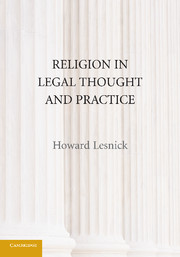Book contents
- Frontmatter
- Contents
- Preface
- I INTRODUCTIONS
- II MORAL OBLIGATION AND RELIGIOUS BELIEF
- III RELIGION AND SOME CONTEMPORARY MORAL CONTROVERSIES
- IV THE INTERACTION BETWEEN RELIGION AND THE SECULAR LAW
- V RESPONDING TO RELIGIOUS DIVERSITY
- VI RELIGIOUSLY GROUNDED MORAL DECISION-MAKING IN PROFESSIONAL LIFE
- Copyright Permission Acknowledgments
- Authors of Works Reprinted
- Scriptural Passages
- Index
III - RELIGION AND SOME CONTEMPORARY MORAL CONTROVERSIES
Published online by Cambridge University Press: 05 June 2012
- Frontmatter
- Contents
- Preface
- I INTRODUCTIONS
- II MORAL OBLIGATION AND RELIGIOUS BELIEF
- III RELIGION AND SOME CONTEMPORARY MORAL CONTROVERSIES
- IV THE INTERACTION BETWEEN RELIGION AND THE SECULAR LAW
- V RESPONDING TO RELIGIOUS DIVERSITY
- VI RELIGIOUSLY GROUNDED MORAL DECISION-MAKING IN PROFESSIONAL LIFE
- Copyright Permission Acknowledgments
- Authors of Works Reprinted
- Scriptural Passages
- Index
Summary
In this and the next part of the book, we examine the interaction between religion and a number of specific moral questions that are contested in our culture. One attribute of that culture is the tendency to conflate moral and legal or public policy questions, to move too casually from a judgment that a certain act is wrong to a call to “outlaw” it. One might oppose that call on the ground that the act is not wrong, but even if it is, there will be many other bases on which one might oppose the enactment of a prohibition, regulation, or other legal initiative designed to deter commission of the act. The weight of those considerations is an issue somewhat (although perhaps not entirely) independent of the antecedent moral question.
We turn in this part to contexts that will emphasize the contention that a certain act or set of conditions is (or is not) wrongful, for the most part postponing the second issue to Part IV. This choice is designed to emphasize the importance of distinguishing that question from the one of legal response.
Between the individual and the governmental sphere of action is — or, for the most part, was — an intermediate zone. Religiously grounded moral claims arose as claims addressed to a faith community — “the church” in Christian parlance, “Israel” in the Hebrew Scriptures and the rabbinic tradition. It remains so, for some, today. It is for that reason that we begin with the question of the legitimacy of serious economic deprivation and inequality.
- Type
- Chapter
- Information
- Religion in Legal Thought and Practice , pp. 217 - 218Publisher: Cambridge University PressPrint publication year: 2010



